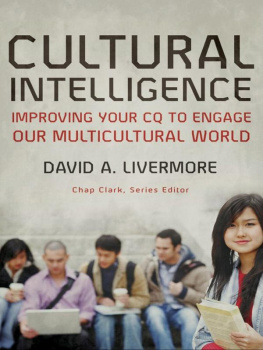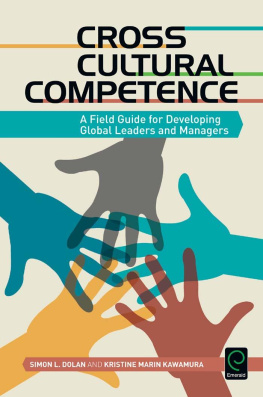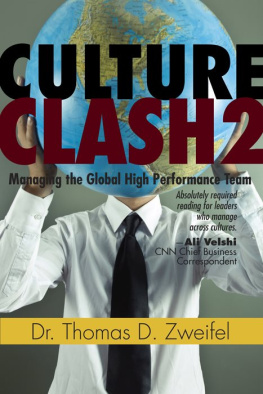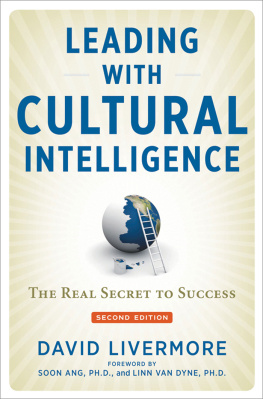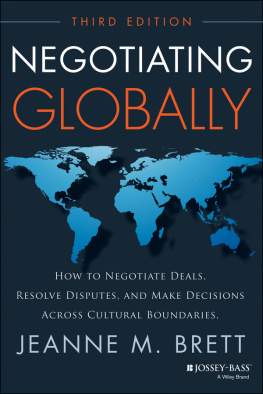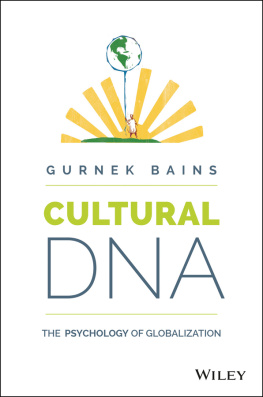Cultural Intelligence
CULTURAL INTELLIGENCE
Surviving and Thriving in the Global Village
THIRD EDITION
DAVID C. THOMAS
and
KERR INKSON

Cultural Intelligence
Copyright 2017 by David C. Thomas and Kerr Inkson
All rights reserved. No part of this publication may be reproduced, distributed, or transmitted in any form or by any means, including photocopying, recording, or other electronic or mechanical methods, without the prior written permission of the publisher, except in the case of brief quotations embodied in critical reviews and certain other noncommercial uses permitted by copyright law. For permission requests, write to the publisher, addressed Attention: Permissions Coordinator, at the address below.

Berrett-Koehler Publishers, Inc.
1333 Broadway, Suite 1000
Oakland, CA 94612-1921
Tel: (510) 817-2277, Fax: (510) 817-2278
www.bkconnection.com
Ordering information for print editions
Quantity sales. Special discounts are available on quantity purchases by corporations, associations, and others. For details, contact the Special Sales Department at the Berrett-Koehler address above.
Individual sales. Berrett-Koehler publications are available through most bookstores. They can also be ordered directly from Berrett-Koehler: Tel: (800) 929-2929; Fax: (802) 864-7626; www.bkconnection.com
Orders for college textbook/course adoption use. Please contact Berrett-Koehler: Tel: (800) 929-2929; Fax: (802) 8647626. Orders by U.S. trade bookstores and wholesalers. Please contact Ingram Publisher Services, Tel: (800) 509-4887; Fax: (800) 8381149; E-mail: customer.service@ingram publisher services .com; or visit www.ingrampublisherservices.com/Ordering for details about electronic ordering.
Berrett-Koehler and the BK logo are registered trademarks of Berrett-Koehler Publishers, Inc.
Third Edition
Paperback print edition ISBN 978-1-62656-865-5
PDF ebook ISBN 978-1-62656-866-2
IDPF e-book ISBN 978-1-62656-867-9
20171
Produced and designed by BookMatters. Copyedited by Tanya Grove.
Proofread by Janet Reed Blake. Indexed by Leonard Rosenbaum. Cover designed by Dan Tesser, Studio Carnelian.
To the champions of diversity in all nations
Preface
Cultural intelligence is a critical skill in surviving and thriving in todays global environment. In the second edition we applied cultural intelligence broadly to peoples interactions not just in organizations but in their daily lives. In this third edition we focus on how to develop this critical ability.
We are reminded daily of the globally interconnected world in which we live. Events on one side of the globe reverberate instantaneously on the other. Globalization has many effects, but one of the most important is the dramatic increase in the opportunity and need to interact with people who are culturally different from us. We are exposed on a daily basis to a wide variety of attitudes, values, beliefs, and assumptions that culturally different individuals hold about appropriate behavior. In order to solve the problems of todays global society, indeed in order to function day to day, we must learn to understand and integrate these differences. The range of cultures we encounter in the multicultural cities in which we live may be slightly unusual, but only slightly, as migration patterns around the world respond to rapid economic and political changes. The world is becoming more interdependent; to keep pace we must all learn to think globallywe must all develop our cultural intelligence!
The aim of this book is to help you acquire the global people skills you need to deal with individuals from other cultural backgrounds, which will make you more effective in your all-around performance in the years ahead. It is for people who travel overseas and encounter new cultures, as well as for those who stay at home and find that other cultures have come to them. It is about acquiring the cultural intelligence not only to survive without embarrassment in a new multicultural environment but also to pursue your goals with the confidence needed for success.
Like its predecessors, this book is different from many other books you may have seen about cross-cultural skills or living and working in other countries.
First, this book is not country-specific. We do not provide laundry lists of drills and routines that should be applied in this country or that. Our intent is rather to help you to acquire a way of thinking and being that can be applied to any number of countries and cultures.
Second, this book is based on years of sound academic research. However, it is not an academic text, and we have tried to present important concepts in a straightforward way. To make the learning concrete, we have illustrated each chapter with a number of case studies in cross-cultural behavior, from various cultural settings.
Finally, we dont promise that this book will solve all your interpersonal problems, either at work or in your daily life. However, we sincerely believe that if you read and apply the concepts outlined here, you will be well on your way to acquiring a critical contemporary skillcultural intelligence.
Cultural intelligence builds on earlier concepts that you have probably heard of: the intelligence quotient (IQ) and emotional intelligence (EQ), the idea that it is important how we handle our emotions. Cultural intelligence (CQ) incorporates the capability to interact effectively across cultures.
The concept is easy to understand, but it takes time and effort to develop high levels of skill. Becoming culturally intelligent is essentially learning by doing and has useful outcomes beyond the development of intercultural skills. In addition, different cultures are fascinating, and learning about them can be a lot of fun.
The first three chapters outline the fundamentals of cultural intelligence. helps you to discard your assumptions about the way people should behave, practice mindfulness a kind of attention to culturally based behaviorand develop skills for use in cross-cultural situations. The message in these chapters is that the task of understanding culture is difficult but not impossible, and that if you learn the basic principles, adopt a mindful approach, and are prepared to act as a culturally adaptive person, you can function effectively in a variety of cross-cultural settings, and find the experience rewarding.
In the next four chapters we apply the fundamentals of cultural intelligence to a number of common interpersonal challenges in multicultural settings. By applying the principles outlined, you can be more effective in making decisions in different cultural contexts (education, everyday experience, and foreign travel. This edition also includes the newest measure of cultural intelligence, which is presented in the appendix. This measure is a result of a decade-long research project conducted by an international team of university-based researchers to define and measure the concept of cultural intelligence. The result is a short but theory-based measure of the concept that we hope will be a useful tool to assess and help individuals develop their cultural intelligence. Finally, we provide a bibliography of key sources for those wanting to explore cultural intelligence in more depth.
Kerr is a Scot who lives and works in New Zealand. Dave is a New Zealand citizen but was born and educated in the United States and now lives and works in Canada. As we write and teach about cultural diversity, we are constantly reminded of our own cultural backgrounds. While we both have extensive international experience and between us have lived and worked in eleven different countries, we know that these backgrounds influence how we think and write. We have worked very hard to be objective in this regard, but we would be pleased to hear from readers who feel we have missed or misinterpreted things that are obvious to them from their cultural perspective.
Next page


